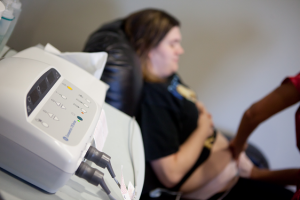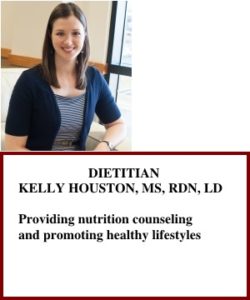Welcome to the office of Dr. Christina Midkiff. We are happy you have chosen our office for your prenatal care and birthing experience. The purpose of the welcoming letter is to encourage your active participation in your prenatal care, and outline basic suggestions to optimize you and your baby’s health.
We encourage visits before planning pregnancy, especially for first time mothers. We can enhance your chances for a successful pregnancy by identifying any risk factors and reducing them when possible. Attention to diet, exercise and personal habits though the pregnancy is important.
At this visit we will discuss your lifestyle habits and your genetic and medical history will be reviewed. We advise the following:
- If you smoke cigarettes, quit or at least reduce to less than half a pack per day. Babies raised in smoke filled wombs have a higher risk of growth retardation, premature delivery and respiratory problems.
- Avoid alcohol consumption; although small amounts of alcohol (one glass of beer or wine) on an occasional basis probably does no harm, no safe amount has been established. Heavier alcohol intake has been implicated in causing the fetal alcohol syndrome, with minor birth defects and mental retardation.
- Avoid drugs or medications unless okayed by your provider. Several medications known to be safe include Tylenol (acetaminophen) for various aches and pains; Sudafed (pseudoephedrine) for nasal congestion; TUMS, Rolaids and other mild antacids for stomach upset; and plain Robitussin for cough. Throat lozenges for sore throat are fine, but if your symptoms persist, CALL US. You should avoid aspirin, ibuprofen, Advil/Nuprin and other over the counter medications.
- While moderate amounts of caffeine (less than 2 cups of coffee per day) are likely to be harmless, greater amounts may cause subtle long term changes for the baby, so excessive coffee, tea and caffeine-containing soft drinks are discouraged. Nutrasweet (aspartame) in moderate amounts appears to be harmless.
Many women are concerned about miscarrying and indeed, about 15% of recognized pregnancies do terminate spontaneously. There is nothing you or we can do to prevent first trimester miscarriages, since most are a result of chromosomal abnormalities. However, it is important to know that almost half of women have some bleeding in the first trimester, and most women continue normal pregnancies. If you have bleeding, cramping or pelvic pain, please CALL US.
Nausea and occasional vomiting are very common, and usually signify a healthy pregnancy. High hormone levels are responsible. These symptoms peak at about 10 weeks gestation. As long as you can keep some fluids down to prevent dehydration, there is no harm even if you lose weight. The best ways to reduce nausea is to avoid having an empty stomach. Get some dry crackers and eat them first thing in the morning. Also try to increase your protein (nuts, beans, eggs, peanut butter) and eat small meals/snacks every 2-3 hours.
Other common problems include constipation and various aches and cramps in the pelvis. To prevent firm stools, drink plenty of liquids and add more roughage and fiber to your diet. Fibercon, a fiber supplement, is very useful in naturally stimulating your bowels. As the womb grows, it is common to have cramps and pulling sensations as the round ligaments as the side of the uterus are pulled. Gas pains and urinary frequency are also common. Persistent sharp pains or increasing cramps should be reported.
If you have any more specific questions, please list them so we can discuss them at your appointment. Please DO NOT hesitate to call us beforehand if any problems occur. We are looking forward to providing you and your partner the BEST prenatal care possible.
THANK YOU!



